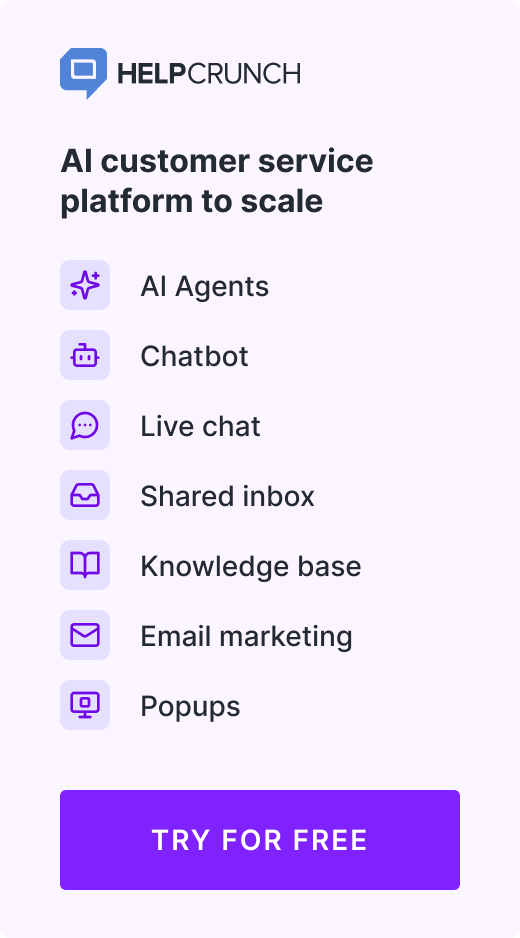Sales Intelligence and Its Undeniable Connection to Lead Generation
By utilizing sales intelligence, you can better manage your prospecting and lead management for increased sales.
Written by Sharee Narciso

These days, traditional sales prospecting is insufficient. It should be accompanied by technologically advanced tools that adapt to your customers’ modern buying behavior. By the way, 94% of sellers say they help them close more deals. Today, there is a plethora of solutions available, all claiming to assist sales teams in increasing their revenue.
There are different types of modern sales tools and services that your revenue team should be familiar with. One of them, sales intelligence, allows you to organize relevant searches for businesses based on a specified set of updated data points. What is it and what place on the market does it take? Let’s find out.
What is sales intelligence?
Sales intelligence refers to a set of tools or solutions that help teams find, collect, analyze, and evaluate data surrounding potential clients. Additionally, it aids in account development and offers you the latest data and information on your prospective clients.
Popular tools on the market that deal with it are LinkedIn Sales Navigator, ZoomInfo, Seamless.ai, Adapt, and more. They are essentially a database of B2B contact and company information that sellers.
However, a new breed of sales intelligence tools is entering the market by offering not just contact information, but also leveraging trigger events and relationship signals. Some examples are Leadfeeder, Bombora, Pipeline Signals, and 6Sense.
What data does sales intelligence deal with?
Data was once thought of as a tool for B2B companies to execute and then learn how to improve performance. This “wait and see” attitude is eliminated by sales intelligence.
Determining sales productivity hinges on whether a business development team functions at peak efficiency and effectiveness when prospecting. However, when data is used productively, it could reveal who, how, when, and why consumers make purchasing decisions. More knowledge about their prospects enables business development teams to construct better outreach and B2B lead generation strategies that can break through the noise and offer value.
Complex B2B sales cycles also require more than just numbers and names. Keeping up with an ever-changing addressable market necessitates proactive intelligence that is updated regularly and can funnel prospects right into the sales team’s workflow.
This is where sales intelligence comes into play. It integrates prospect data with real-time buying signals, allowing business development teams to create relevant sales plays and engage with the right buyer at the right time.
What features do sales intelligence tools usually have?
Creating your ideal client profile and TAM
Sales intelligence aids your sales team in determining which leads should be pursued and which are unfit. Some tools, for example, use predefined rules to prioritize lead lists automatically based on your ideal client profile (ICP).
Intel from these tools frequently includes data that you or your team may need to generate lead lists manually. Following that, it’ll be easy for sales and marketing to determine how much time and money should be spent on pipeline lead activation.
In addition, sales intelligence can be used for forecasting the deal outcome. As a result, you’ll be able to quickly track your team’s performance and better understand which procedures and strategies may be improved. This allows you to enhance your sales results and processes over time and forecast future deals more accurately.
Besides your ICP, understanding your Total Addressable Market (TAM) is another thing made easier through sales intelligence. This is something that many companies and sales teams fail to realize and would often neglect. But what is TAM, and why should you put effort and time into identifying yours?
According to PipelineSignals, “TAM is the total demand for a product or service across all segments, substitutes or alternatives, and distribution methods.”
“Investors and enterprises must understand the revenue potential of selling their product or service in a specific market. The use of TAM allows the sales and marketing teams to formulate a plan effectively, create targets, and track progress.”
Gathering and prioritizing data
Of course, such solutions can also be used to enrich and complete client records in your CRM. Most tools automatically populate any fields that are missing, such as email addresses or phone numbers. Some additionally include information about the business or industry, organizational charts, technographic data, and much more.
Sales intelligence gives you a firm base on which leads to prioritize. Furthermore, it provides context for sales calls and is frequently an excellent place to start a conversation.
It also helps with lead scoring, or how you analyze leads, as well as lead nurturing, or the ongoing building of relationships with your leads. Finally, you’ll only deal with error-free, high-quality data, lose no time, and invest in your potential clients’ relationships.
How does sales intelligence help generate leads?
Sales intelligence works closely with lead generation software. What tasks do they perform and what insights can you get? We explain everything here.
A smarter sales process
You will receive a significant competitive advantage thanks to high-quality, personalized data. But how can a single software program accomplish this? Artificial intelligence is frequently used in these systems. There is growth when AI meets sales. Salesforce found that high-performing teams are 4.9X more likely to be using AI than underperforming ones.
Sales intelligence technologies take over the gathering, sifting, analytics, assessing, and enrichment of massive amounts of data from the internet, depending on the objective. These tools can find everything your prospect has ever made public.
From this information and insights, you can determine the likelihood of getting into a target account and make informed decisions on which accounts to prioritize. Most of the time, you will deal with what is known as compelling event signals.
Increasing productivity and efficiency
Did you know that 64% of your sellers’ day is spent on non-sales tasks? That’s a lot of time spent on things such as researching and background checking. With the help of sales intelligence, you can cut down, if not totally eliminate, this number—giving back to your sellers the time they’d rather use to do what they’re skilled at and trained for: selling.
Sales intelligence automates the formerly manual process of discovering key insights, validating them for accuracy, and providing you with a complete picture of each prospect. Most solutions have notification features that alert users about organizational changes that may present an opportunity for them within their prospective accounts or when a new company meets their ideal client profile criteria.
Understanding your prospects better
No matter how talented you are at pitching, it’s always tricky to cultivate leads, deliver a personalized offer to each client you contact, move them down the sales funnel, and finally close sales. This is especially true when dealing with businesses that don’t have a clear use for your offers or whose purchasing timing is utterly off.
Sales intelligence lets sellers know precisely who they should be talking to, what they should be discussing, and when they should contact them and communicate critical information during the discussion. This can significantly improve your sales process. Combining company data with tidy customer relationship management can create a well-oiled sales machine that offers relevance at scale.
Shortening sales cycles
Many systems include alerts as well. This feature is handy and time-saving because it sends you email updates on what’s going on with your target audience and prospects. You will receive an email when there are new selling possibilities, data modifications, or a new entry. Sales intelligence doesn’t get any easier than this.
More importantly, your sellers will be able to identify which accounts to prioritize based on urgency and their likelihood of converting. This entire process allows your sales team to prospect, sell, and close without any personal biases.
Tracking signals and qualifying leads
Modern technologies can aid lead prospecting and lead production by using your predefined criteria to identify the businesses and individuals most likely to become your future clients.
You will obtain lead lists that include a variety of crucial information about your target clients, such as location, corporate information, publicly available personnel contact information, and media mentions.
This way, sales managers and reps can get hot leads given to them instantly with only a few clicks. With this additional information, you and your sales team can get right to the point and start chatting sooner with potential clients.
You can use sales intelligence to identify businesses that are similar to your current clients. Based on your search profile, you should see which organizations can use your service or product. You can also be sure that there is a need for your solutions or offers if you work with similar businesses.
Wrap-up
Now that you understand the topic, let me provide you with a vivid solution example. For instance, Sales For Life’s ScalePipeline System (SPS) is a tool that achieves these results by merging sales data, sales effectiveness, and processes to increase sales conversions. It helps B2B revenue teams build a sales pipeline at scale.
Whether you’re selling to net new accounts, upselling, or cross-selling inside your existing client base, the ScalePipeline System will help you enhance your sales funnel in as little as three months.
SPS will map out your Total Addressable Market (TAM) and monitor your accounts to achieve this, allowing your sellers to engage the right leads at the right time to create opportunities.
One thing is certain: sales intelligence is no longer optional—especially if you want to maximize your sales! Do you need more leads? Is there a way to get more high-quality data? Do you want to spend less time on research and more time securing deals?
You know what to do now.





